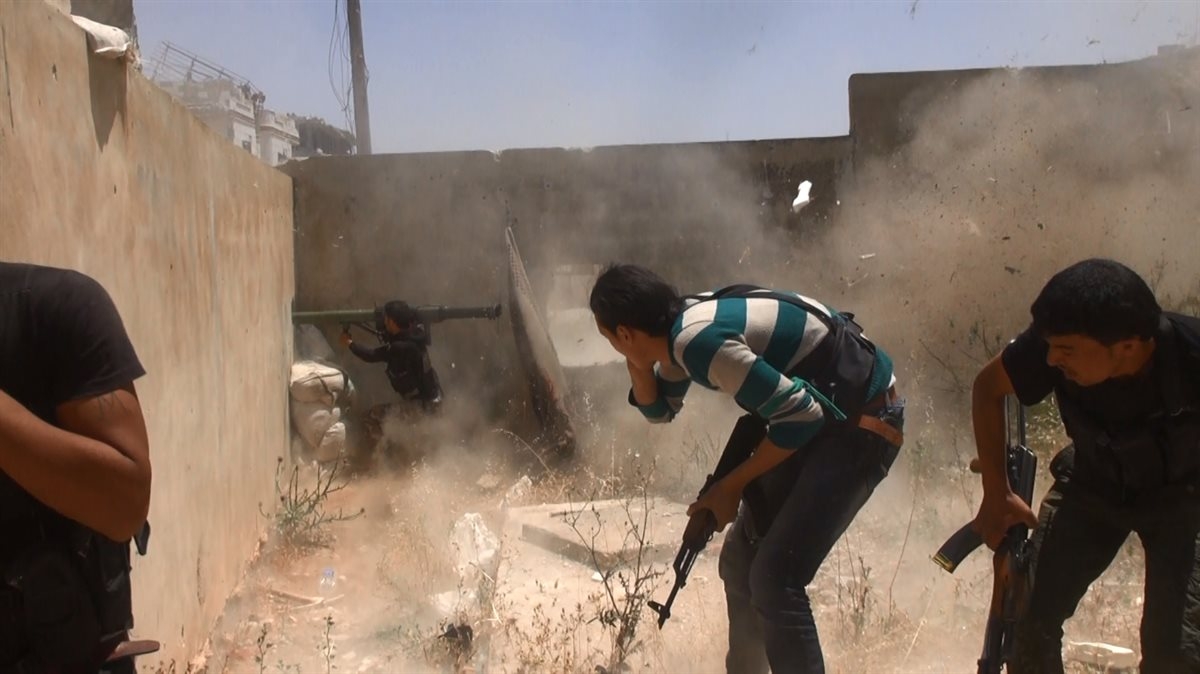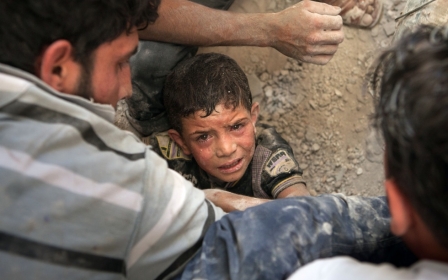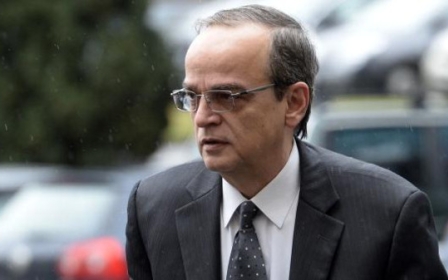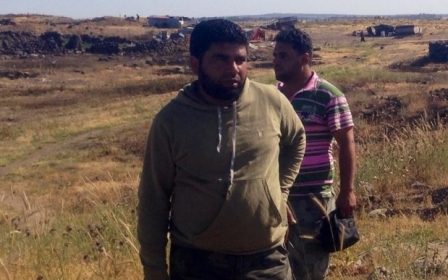Gearing up for the next act in Syria’s last rebel stronghold

More than a year after they started asking in earnest, the US Senate has agreed to switch on a $500 million programme to train and arm Syria’s non-Islamist, or “moderate” rebels. But there’s a hitch: the American-approved target is the Islamic State militant group, not Assad’s government.
The shift from covert to overt and larger-scale support for Syria’s rebels, and the supply lines that will deliver that support, are likely to be rooted in the southern province of Dera’a. The deeply conservative province is the birthplace of Syria’s stalled revolution and the home of the Free Syrian Army, those so-called moderate rebels the American-led coalition aims to enlist as foot soldiers in its war on IS.
Dera’a is also the easiest way into Syria from Jordan, the US’s closest Middle-Eastern ally. The province sits on a stretch of the Jordan-Syria border, neatly managed by Jordanian border forces and their FSA counterparts. Border insiders and NGO staff with knowledge of cross-border traffic describe a high-functioning collaboration between the two groups, where people and goods cross through carefully monitored, informal crossing points. And with Jordan reportedly offering to send special forces into Syria as part of the US-led mission, Dera’a is the only sensible way in.
A worn down FSA?
But over the border, things have changed. Worn down by the government’s superior firepower, political squabbles, weapons shortages and competition from other, often better-funded rebel groups, the FSA has contracted, divided and regrouped. The result is an uneven, sometimes disorganised fighting force.
“The term ‘FSA’ is idiomatic now. It’s not one group with one leader,” said Islam Alloush, spokesman for rebel group Jaish al-Islam, which is allied to groups under the FSA umbrella.
In Dera’a, the two main groups are the Yarmouk Division, headed by travel agent-turned-battlefield commander Bashar al-Zoabi, and the al-Omari Brigade, whose leader was recently assassinated by an activist allegedly tied to Jabhat al-Nusra.
Both al-Zoabi and al-Omari’s late leader Qais al-Qatanah said they benefited from the flow of US arms and support that trickled north from Jordan, but it wasn’t enough: “Our biggest problem on the ground is a lack of quality weapons,” said al-Zoabi.
Rather than be pushed out of their last stronghold, in Dera’a, these men have joined forces with al-Qaeda affiliated Jabhat al-Nusra; America’s old enemy.
It’s a means-end compromise that has delivered real results; locals say rebels now control about 60 percent of Dera’a province, up from 50 percent earlier this summer. But in the longer term, it’s difficult to see how this can work. The two groups have markedly different, arguably hazy visions for a post-Assad Syria: most FSA factions fall under the Syrian Coalition, which wants a secular, democratic Syria, whereas Nusra wants an Islamic state governed by Sharia law.
Short-term alliance, strategic gains
Despite the long-term uncertainty, this short-term alliance makes sense for the broader Syrian opposition, which needs military victories to ground its political aims. And it’s working: Oubai Shahbandar, Strategic Communications Advisor for the Syrian Coalition said that Dera’a is one of the few places rebels are still gaining ground on the government.
“Despite Assad and Nasrallah's declarations of victory earlier this summer, they are clearly unable to fully control the capital and strategic terrain in the south,” he added.
What’s more, recent gains have increasing strategic value: by targeting efforts on a particular part of the Golan Heights last week, the FSA-led rebel force opened up a supply line that could connect them to rebels in the north of the country. Shahbandar described it as “a new level of operational sophistication demonstrated by opposition forces on the ground.”
But from Damascus, what’s happening in Dera’a looks less like operational sophistication and more like desperation.
“Jabhat al-Nusra always forgets they are al-Qaeda in Sham [Syria]. They will never be accepted by any moderate party. The FSA only fights with them because they are good fighters,” said a source close to the government, speaking anonymously because he is not authorised to comment on the issue.
“The FSA and the other rebels it fights with are strong in Dera’a. But it’s always a back and forth; the rebels take an initiative and then the army responds,” he added.
If the FSA were to sever the collaboration, Mohammed Ktefan, a member of Jabhat al-Nusra in Dera’a, was doubtful it could advance without Nusra’s support.
“The FSA is relatively successful in some aspects, but in terms of command and control and field coordination they’re severely weak,” Kfetan said.
Ktefan was dismissive of the group’s reliance on foreign backers - backers that have left it begging for support for more than a year, and only now offer to extend that support as a means to achieve their own ends.
“The FSA’s biggest weakness is their loss of self-decision. Their decisions often depend on foreign countries and operations rooms and the decisions they make there. If the FSA wants to attack any regime military site and they don’t get the approval of the supporting countries, then they can’t do anything,” he said.
And this is the crux of the FSA’s problem: the coalition of countries finally offering help have approved an operation against IS, not the Syrian government. And for those at the heart of the Syrian opposition, the number one enemy is still Assad.
“The major and most dangerous threat is the criminal regime,” said al-Zoabi. “IS has committed crimes against the Syrian revolution, but IS only exists because of international silence about Assad's regime. When Assad is finished, this extremism will go with him.”
Despite the fact that any international support for his troops would be aimed at eliminating IS, not Assad, al-Zoabi is clear on his goal: “We’re asking God for a Syria free from Assad and his gang.”
Last item on a laundry list
Yet after more than three years of brutal civil war with an ever-expanding cast of belligerents from home and abroad, the viability of that goal is in doubt.
In Damascus, Dera’a is viewed as a last item on a laundry list, said the government source: “As long as they don’t make a significant advance on Damascus, they can stay in Dera’a until their turn comes. And it will come.”
Just over a month ago, US President Barack Obama called the idea that the US could somehow support the Syrian opposition into making that significant advance “a fairy tale.”
But earlier this month, and with a new enemy in the crosshairs, Obama’s White House chief of staff, Denis McDonough backtracked on the statement and said those same rebels were “getting better and more capable.”
In Dera’a, they are; by fighting alongside people the US calls terrorists, with whom they share a single goal that doesn’t align with the US vision for the region.
“What's most important here is that the Syrian opposition on the ground fighting IS can count on American and coalition airpower to supercharge their effort. That's important and that's ultimately going to be what is called for in this strategy,” said McDonough in a CNN interview on 14 September.
This strategy, made in Washington, may look slightly different from Dera’a.
New MEE newsletter: Jerusalem Dispatch
Sign up to get the latest insights and analysis on Israel-Palestine, alongside Turkey Unpacked and other MEE newsletters
Middle East Eye delivers independent and unrivalled coverage and analysis of the Middle East, North Africa and beyond. To learn more about republishing this content and the associated fees, please fill out this form. More about MEE can be found here.




